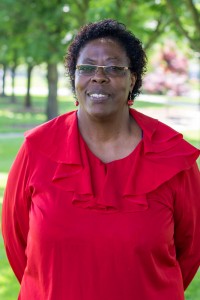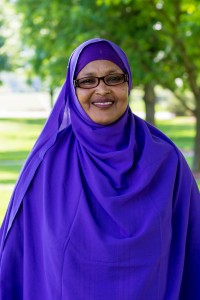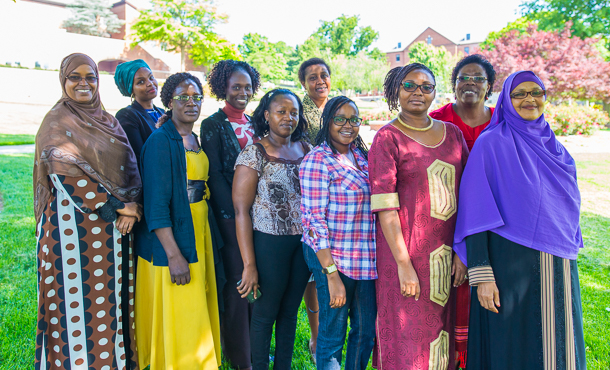Eight women who comprise the fourth cohort of Eastern Mennonite University’s Women’s Peacebuilding Leadership Program will return to Kenya this week after intensive studies at the Summer Peacebuilding Institute.
The women, selected from a competitive process earlier this year, have diverse professional experiences and skills: they are writers, poets, court officers, county commissioners, non-profit CEOs, lawyers, and educators — peacebuilders all — representing Kenya’s various geographic regions, religions and ethnic communities.
Their coursework at SPI is the first step in a 19-month process that will ultimately lead to a graduate certificate in peacebuilding leadership.
“It’s been wonderful to see our WPLP cohort here on campus, taking classes and sharing about their peacebuilding work with other SPI participants,” said Leda Werner, program director. “Their coursework in peacebuilding leadership, conflict analysis, and responding to violent extremism blends academic theory and practical tools, providing them with a solid foundation needed to carry out their intervention plans in their communities later in the program.”
The fourth cohort is one of two cohorts sponsored by a $900,000 grant from U.S. Agency for International Development (USAID) Kenya and East Africa. A second cohort of eight women from the Horn of Africa region will enter WPLP in May 2017. Launched in 2012, the WPLP program has graduated 42 women from Africa and the South Pacific.
New focus on responding to violent extremism

Accompanying the group are Rosa Wanyagi, USAID Kenya and East Africa representative, and Nuria Abdi, a 2007 CJP graduate who serves as the cohort’s regional advisor.
The cohort is the first to engage with a new curriculum designed specifically to address USAID objectives of responding to violent extremism, women’s empowerment and good governance. Other structural and curricular changes reflect the program’s growth and development based on participant feedback and monitoring and evaluation data gathered from the previous three cohorts, Werner said.
SPI has been six weeks of “learning in class and outside of class on topics relevant for us and for our situations,” said Maryam Sheikh Abdikadir. The women engaged in personal assessments in the “Leadership for Peacebuilding” course, evaluating their own weakness and strengths and then learning new skills. Courses on conflict analysis and peacebuilding responses to violent extremism followed.
“So often we observe and end up judging,” Abdikadir said, “and being able to analyze perceptions, root causes, drivers, mitigators and allies within the conflict — that is really an important life skill that you can apply in all kinds of situations.”
Sharing and learning from international peacebuilders about their experiences with violent extremisim was “profound,” she added. “Listening to these examples from around the world caused me to look at my own situation differently.”

The women are in the midst of discerning the specific conflict they’ll address in the intervention project, the final phase of the program. Among the possibilities: addressing historic clan conflicts, community conflicts and cross-border conflicts in the northeast, western, and Rift Valley areas of Kenya; bolstering the use in courts of alternative dispute resolution for family and community-related violent conflicts; and working to resolve negative social effects of a government-led security operation aimed at protecting Kenya from Al Shabaab attacks.
The women return to Kenya with assignments to finish this fall. In January, they will take Strategies for Trauma Awareness and Resilience (STAR) Level 1 followed by an intervention design workshop led by former WPLP director Jan Jenner. As the participants put their intervention plans into action in the spring of 2017, they are supported and guided through online praxis workshops, where they are joined by Abdi, WPLP staff and local and regional peacebuilding experts. A final class on mobilizing for systems change examines how to increase the reach of their intervention, which continue through the fall. A December 2017 graduation is planned.
WPLP Cohort 4
Maryan Sheikh Abdikadir works for Serve Women and Children Empowerment and Development Agenda, an NGO in Garissa and Kismayo that rallies Somali women to work for peace using clan and family networks. She also volunteers for NEPA, an association for Somali professionals, and is a writer and a poet for advocacy and activism. Maryam has a Bachelor of Education degree and an MA in development studies.
Judith Nasimiyu Mandillah has been a probation officer for 25 years, and is now the chief probation officer of the Kakamega High Court, where she leads and advocates for alternative dispute resolution processes. Judith has a BA in counseling from Kampala International University and is currently completing an MA in peace and conflict studies from Masinde Muliro University of Science and Technology.
Rachel Cherotich Mutai is the curriculum development coordinator at African Leadership and Reconciliation Ministries (ALARM), an NGO that works to promote community healing and reconciliation. She has conducted trauma healing programming for women, led youth leadership development activities, and been involved in a domestic violence counseling ministry. Rachel has a BA in Theology from Kenya Highlands Evangelical University and an MDiv from Africa International University.
Violet Wairimu Muthiga is the CEO of Sauti Ya Wanawake Pwani, a women’s organization based in Mombasa that works in six coastal counties. Violet conducts trauma counseling for mothers of youth who have been radicalized, reintegration programs for de-radicalized youth, and civic education related to UN 1325. Violet has a BA in sociology from Egerton University and is currently completing her thesis for her MA in project planning and management at University of Nairobi.
Sarah Chelimo Naibei recently transitioned into the role of assistant county commissioner from her previous position at the Peace and Rights Program where she played a role in the signing of a peace agreement between conflicting communities in Mt. Elgon. She has rehabilitated ex-combatants and child soldiers. Sarah has a BA in gender and development from Makarere University and an MA in project planning and management at the University of Nairobi.
Catherine Gaku Njeru is a gender specialist at the International Peace Support Training Center. Among other work, she has been involved in the design of Kenya’s national action plan for implementing UN 1325 and on training for the military in peacebuilding, and on child development and women’s empowerment programs. Catherine has a BA in sociology from Egerton University and an MA in project planning and management from the University of Nairobi.
Beatrice Kizi Nzovu works for Life and Peace Institute, focusing how communities—and specifically women—can build resiliency against violent extremism. She has worked with cattle rustling and resource issues in North and South Rift, land conflicts in the coast, gender mainstreaming at the regional level, and post-election violence. Beatrice has a BA in sociology from Maseno University and an MA in peace studies and conflict transformation from European University.
Shamsa Hassan Sheikh works for the Wajir County Land Management Board, where she designs and facilitates local alternative dispute resolution processes for land and resource-based conflicts. She also aids in the review and drafting of land and resource-based policies. Shamsa has a BA in law from the University of Nairobi.

My stay at EMU has an indelible mark in my personal and career life. I appreciate the humility and love that is the scenery and culture of the CJP community. The knowledge and skills learned were profound and have paved a way to me to create more space for new challenging opportunities, for making a difference implicitly and explicitly in my community especially in ensuring sustainable peace and resilience to counter any violent acts. What a wonderful time, strong network that I have developed has a formidable change in my life.
God’s Blessings to all